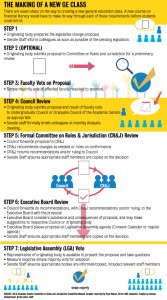Many students are graduating from UCLA with a poor grasp on the skills necessary to survive in the world’s financial market.
In Sunday’s Registration Issue, I recommended that financial literacy be worked into UCLA’s General Education curriculum.
Among the possible options, it seems that the best way to make such a change would be to eliminate another GE class.
Now, that’s a drastic step.
There are basically three choices for establishing a new GE class: we can eliminate a class and use the funds to start this one, start a new class from scratch or start an online class.

(click to enlarge)
That’s without adding in the cost of teaching assistants, which could easily bring the total to north of $100,000.
Another option would involve creating an online class that every student is required to take before graduation.Such a class would limit the costs of in-person instructors, but would require the development of software infrastructure that could be expensive.
In addition, there’s no proof that online education provides the comprehensive educational value students derive from in-person interaction with a professor. It’s easy to click through an online class and dismiss the information.
Given the importance of financial literacy,it’s necessary to engage students in the most meaningful way possible.Online education has yet to prove it can do that.
So that leaves the first option – cutting a class – and that becomes tricky, as value judgments tend to be.
A financial literacy class would have great value, but some could argue that it’s subjective and hard to say whether a financial literacy class has more value than any of our current GE classes.
But the comparsion is not totally subjective.
According to a report published by American University Washington College of Law, the general populace’s lack of understanding contributed, in part, to the global economic collapse of 2008.
That example, though extreme, has a clear point: financial literacy has tangible effects on the financial health of society as a whole.
That is to say, it has more tangible effects on daily life than a class on black holes or dinosaurs.It’s very important to note here that I’m not saying these classes don’t have value.They absolutely do. But financial literacy is more relevant to students on a day-to-day basis.
Eliminating a class would only solve a part of the problem – UCLA also needs to find a way to couch a financial literacy course in the current GE structure. While the logistics are complicated, such a course could constitute the third requirement in the Foundations of Society and Culture category, for example.
In a perfect world, there would be enough money to go around, allowing us to study both dinosaurs and bank loans. However, until then, UCLA faculty and administrators should base curriculum decisions on real, practical merit.
Since the class could be lecture only, the upstart costs in comparison to other classes would be minimal. However, in order to keep the bottom line the same, another class has to go.
Given how integral financial literacy is to surviving in the 21st century, UCLA needs to make the hard choice and re-evaluate its classes and priorities as an institution designed to prepare students for life outside of school.